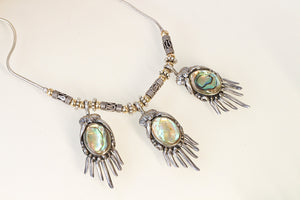Tarnishing happens when the surface of metal jewelry reacts with air, moisture, or chemicals, causing a dull, darkened appearance. It's a common issue for anyone who owns silver, copper, or gold-plated jewelry.
The truth is, most tarnished jewelry can be easily cleaned at home using simple household ingredients you probably already have in your kitchen. This guide will show you quick, safe, and affordable DIY jewelry cleaning methods that can restore your treasured pieces in just minutes.
Why Jewelry Gets Tarnished
Understanding why jewelry tarnishes is the first step in preventing and treating this common issue. Tarnishing is essentially a chemical reaction called oxidation, where metals interact with elements in their environment.
Metals Most Prone to Tarnishing:
- Sterling silver - Contains 92.5% silver and 7.5% copper, making it highly susceptible to tarnish
- Copper and brass - Develop green or blue-green patina over time
- Gold-plated jewelry - The thin gold layer can wear away, exposing underlying metals
- Costume jewelry - Often made with alloy metals that tarnish quickly
Common causes of tarnish:
- Air exposure - Sulfur compounds in the air react with metals
- Moisture - Humidity accelerates the tarnishing process
- Body chemistry - Natural oils, sweat, and pH levels affect different people differently
- Beauty products - Lotions, perfumes, hairsprays, and makeup contain chemicals that cause tarnish
- Environmental factors - Pollution, chlorine, and household cleaning products
Spotting Tarnish vs. Dirt Buildup:
Tarnish appears as a dark, dull coating that can't be wiped away with a cloth, while dirt buildup is surface-level and can usually be removed with gentle cleaning. Silver tarnish typically appears black or gray, while copper develops a green patina.
Quick Home Remedies for Cleaning Tarnished Jewelry
These proven home remedies use common household items to safely remove tarnish and restore your jewelry's shine.

a. Baking Soda & Water Paste
Materials needed:
- 2 tablespoons baking soda
- 1 tablespoon water
- Soft toothbrush or cloth
- Clean water for rinsing
Step-by-step instructions:
- Mix baking soda with water to form a thick paste
- Apply paste to tarnished areas using gentle circular motions
- Let sit for 2-3 minutes
- Scrub gently with soft toothbrush
- Rinse thoroughly with clean water
- Dry completely with soft cloth
Best for: Sterling silver, gold jewelry, and most metal types

b. White Vinegar & Baking Soda Soak
Materials needed:
- 1/2 cup white vinegar
- 2 tablespoons baking soda
- Small bowl
- Soft cloth
Step-by-step instructions:
- Pour vinegar into bowl
- Add baking soda (mixture will fizz)
- Submerge jewelry for 2-3 hours
- Remove and scrub gently with soft cloth
- Rinse thoroughly and dry
Best for: Heavily tarnished silver and copper jewelry

c. Aluminum Foil & Hot Water Method (Electrolytic Reaction)
Materials needed:
- Aluminum foil
- Hot water
- 1 tablespoon baking soda
- Glass or ceramic bowl
Step-by-step instructions:
- Line bowl with aluminum foil, shiny side up
- Add hot water and baking soda
- Place jewelry on foil (must touch foil)
- Let sit for 5-10 minutes
- Remove with tongs
- Rinse and dry thoroughly
Best for: Silver jewelry with intricate designs

d. Toothpaste Trick (For Tough Stains)
Materials needed:
- Plain white toothpaste (not gel)
- Soft toothbrush
- Warm water
Step-by-step instructions:
- Apply small amount of toothpaste to jewelry
- Scrub gently with soft toothbrush
- Focus on heavily tarnished areas
- Rinse thoroughly with warm water
- Dry completely
Best for: Gold and silver jewelry with stubborn tarnish

e. Lemon Juice & Salt Scrub
Materials needed:
- 1 tablespoon lemon juice
- 1 teaspoon salt
- Soft cloth
- Warm water
Step-by-step instructions:
- Mix lemon juice and salt to form paste
- Apply to tarnished areas
- Rub gently with soft cloth
- Let sit for 5 minutes
- Rinse thoroughly and dry
Best for: Copper and brass jewelry

f. Mild Dish Soap & Soft Toothbrush
Materials needed:
- Few drops mild dish soap
- Warm water
- Soft toothbrush
- Clean cloth
Step-by-step instructions:
- Mix soap with warm water
- Dip toothbrush in solution
- Gently scrub jewelry
- Pay attention to crevices and details
- Rinse thoroughly and dry
Best for: Daily maintenance and light tarnish on all metals
Cleaning Different Types of Jewelry
Different metals and gemstones require specific care to avoid damage while effectively removing tarnish.
Sterling Silver Jewelry:
- Use any of the above methods
- Avoid chlorine bleach or ammonia
- Polish with silver cloth after cleaning
- Store in anti-tarnish bags
Gold Jewelry:
- Solid gold: Use mild soap solution or baking soda paste
- Gold-plated: Be extra gentle; use only mild soap solution
- Avoid abrasive materials that can scratch the surface
Costume Jewelry:
- Test cleaning method on inconspicuous area first
- Use mildest method possible (dish soap solution)
- Dry immediately to prevent further tarnishing
- Consider clear nail polish to seal and protect
Gemstone Jewelry:
- Hard stones (diamonds, sapphires): Can handle most cleaning methods
- Soft stones (pearls, opal, turquoise): Use only mild soap solution
- Porous stones: Avoid soaking; use damp cloth only
Mistakes to Avoid When Cleaning Jewelry
Avoid these common jewelry cleaning mistakes that can cause permanent damage:
Using Harsh Chemicals:
- Never use: Bleach, ammonia, or chlorine-based cleaners
- Why: Can dissolve metals and damage gemstones
- Instead: Stick to mild household ingredients
Abrasive Materials:
- Avoid: Steel wool, rough cloths, or hard-bristled brushes
- Risk: Scratches and surface damage
- Use instead: Soft cloths, gentle toothbrushes, or cotton swabs
Over-Soaking:
- Problem: Extended soaking can loosen glued stones
- Time limit: Never soak for more than 30 minutes
- Special care: Vintage pieces with glued elements
Using Hot Water on Delicate Pieces:
- Risk: Thermal shock can crack stones or loosen settings
- Safe temperature: Lukewarm water only
- Extra caution: Antique or estate jewelry
Mixing Different Metals:
- Issue: Different metals can react with each other during cleaning
- Solution: Clean each piece separately
- Storage: Keep different metals in separate compartments
Using Toothpaste on Soft Materials:
- Never on: Pearls, opals, or soft metals like gold-plated items
- Reason: Toothpaste is abrasive and can cause scratches
- Alternative: Mild soap solution only
How to Prevent Tarnish from Coming Back
Prevention is always better than treatment. Here's how to keep your jewelry looking pristine:
Proper Storage Solutions:
- Anti-tarnish pouches: Individual fabric bags treated with anti-tarnish agents
- Airtight containers: Plastic bags with silica gel packets
- Jewelry boxes: Lined with anti-tarnish cloth
- Separate compartments: Prevent metals from touching each other
Daily Care Tips:
- Remove before: Showering, swimming, exercising, or sleeping
- Apply first rule: Put on jewelry after applying lotions, perfumes, and makeup
- Clean regularly: Wipe with soft cloth after each wear
- Dry thoroughly: Ensure jewelry is completely dry before storing
Key Takeaways
Regular jewelry cleaning doesn't have to be expensive or complicated. With these simple home remedies using common household ingredients, you can restore your tarnished jewelry to its original beauty in just minutes. From the baking soda paste method for everyday maintenance to the aluminum foil technique for heavily tarnished pieces, these DIY jewelry cleaning solutions are both safe and effective.
Remember, prevention is key to maintaining your jewelry's appearance. Proper storage, regular cleaning, and mindful wearing habits will keep your pieces looking their best for years to come. Start with gentle methods and work your way up to stronger solutions only if needed.
Looking for high-quality jewelry that resists tarnishing? Explore Rebeka Jewelry's collection of unique, premium pieces crafted to maintain their beauty over time. Our carefully selected materials and expert craftsmanship ensure your jewelry stays stunning with minimal maintenance.







Leslie Henry - December 19, 2025
Thank you for these super helpful instructions!!!